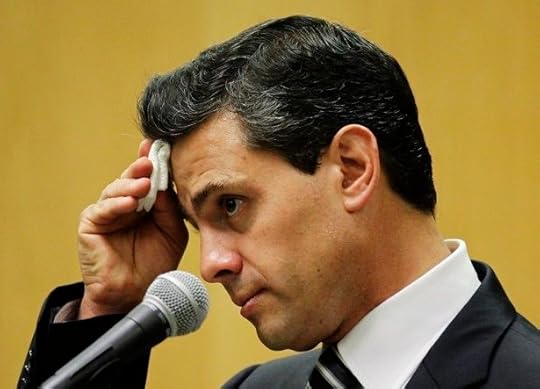Atlantic Monthly Contributors's Blog, page 93
August 24, 2016
So Is It Blond or Blonde?

Since The Atlantic has been publishing so much about Frank Ocean lately, a colleague asked that someone clear up a confusing linguistic issue: Is his album Blonde or Blond?
Both. The title of Frank Ocean’s excellent and bizarre new release is spelled different ways in different official locations. On Ocean’s own site, he has posted two album covers that don’t feature the “e.” On Apple Music, where the album is exclusively streaming, it is listed as being spelled with the “e.” If Apple Music’s listing were incorrect, you’d think Ocean and his team would insist it be changed by now. Instead, Ocean posted a Tumblr picture with the caption “Birthday cake for Blonde.”
So it seems pretty clear by now the ambiguity is intentional—and of a piece with Ocean’s larger M.O. lately. “I got two versions” are his first words on the first piece of Blond(e) music released to the public, the music video for “Nikes.” Incidentally, the version of that song that’s actually on the album does not have Ocean saying that.
The most common theory for the meaning of the spelling duality is that the word “blonde” is a gendered adjective, referring to fair-haired women, while “blond” can apply to anyone. That Ocean’s new album could be spelled either way might be a reflection of his own sexuality—lyrics on the album refer to relationships with both men and women.
But I’ve actually taken to thinking about the “e” in Blond(e) in even more high-concept terms—a symbol of all the ambiguity that fascinates Ocean. The last song on Endless, the visual album he released 48 hours before Blond(e), is called “Higgs,” which may or may not be a reference to the subatomic particle of the Higgs Boson. It’d make some sense if it was: The so-called “God particle” can either contain mass or not, almost immediately disappears into nothingness after coming into somethingness, was first detected by humans in July 2012 (a few days before Ocean’s album Channel Orange arrived!), and, of course, is prone to mis-explanation and misunderstanding by laymen like me.
Which is another way of saying the “e” is for “enigmatic.”
* * *
That a highly anticipated release from a major artist doesn’t have an agreed-upon title fits Ocean’s apparent business mission in 2016, too. To borrow and pervert a buzzphrase, he’s culture jamming, injecting some individuality into a corporatized system and, perhaps, antagonizing it.
On Tuesday, news broke that Ocean was no longer with the major label Def Jam and that Blond(e) had been released independently. A source told Pitchfork that Endless, the aforementioned visual album that immediately preceded Blond(e), “fulfills Frank’s obligations to Def Jam and Universal.”
Ocean isn’t giving interviews, and Def Jam hasn’t officially commented on the situation, but this all seems like some pretty remarkable maneuvering on the artist’s part. He’s previously had a strained relationship with his label, as seen when he put out his debut 2011 mixtape independently on his blog because, he said, Def Jam wouldn’t release it officially. Endless is a decidedly un-album-like “album,” a compilations of demo-like song snippets accompanying a 45-minute video of Ocean building a staircase. You can’t buy the tracks individually or buy any of it in the iTunes store—you can only stream the full video on Apple Music.
Blond(e), it would stand to reason, is going to make more money than Endless for the simple fact that it’s actually for sale. In releasing Endless to fulfill his record contract and then immediately releasing the more anticipated and more monetizable Blond(e) independently, he may be denying the conglomerate he used to work for their biggest potential payday from him yet.
Ocean releasing music independently through Apple is a sign of why labels might try to ban exclusives.
Forbes reports that Universal Music Group, Def Jam’s parent company and currently America’s best-selling record company, is not happy:
For UMG, Blonde has led to a massive rift with one of its key artists and a decision to decouple itself from the lucrative, but oft criticized practice of providing exclusive streaming rights. On Monday, music industry analyst and critic Bob Lefsetz reported that UMG CEO Lucian Grainge sent an email to other executives stating that the company, which represents artists like Drake and Kanye West, would end all exclusives with music streaming companies like Apple. At least two sources confirmed to FORBES that his decision was influenced partly by Ocean’s move to partner with Apple for his newest album.
It would be a major change for the music landscape if Universal really did start blocking exclusives: Huge artists like Drake, Kanye West, and Rihanna are on the company’s roster and have all released exclusives to either Apple or Tidal this year. Ocean ditching a label and releasing music just through Apple is a move that, when taken with his friend Chance the Rapper’s independent release of his acclaimed Coloring Book via Apple, is a sign of why labels might want to ban exclusives. Not only do they limit the potential reach of a work of music, but they also represent an opportunity for artists to make money and distribute their products without a record deal.
Of course, angering Universal comes with big risks because it represents a loss of resources and, perhaps more importantly, the potential burning of bridges with important people in the industry. The situation might help explain Kanye West’s Twitter tirade yesterday: “If anyone at radio really loves music ... Come together and pick your favorite Frank Ocean song and play it at least 10 times a day. […] Every station across the globe. I Heart. Clear Channel local stations. Satellite. Every station. This will make the world better.”
Ocean may have even been trolling his new corporate patron Apple by having Endless close with a Wolfgang Tillman song that satirically extols the virtues of the iPhone—and also the devices of competitors Sony and Samsung. There are few to no major musicians working today wholly independent of big-business alliances, but you can imagine Ocean would someday like to be. This is someone who once backed out of singing in a Chipotle ad, and then posted online that he returned the company’s payment of $212,500 with a check that said “FUCK OFF.” This is someone who put out an album and wouldn’t tell anyone the proper way to spell its name.

Turkey's New Incursion Into Syria

NEWS BRIEF Hours before U.S. Vice President Joe Biden landed in Turkey on Wednesday, the Turkish military drove tanks across the Syrian border, protected overhead by U.S. aircraft, in what is Turkey’s largest ground operation in Syria.
Turkish forces are aiming to take control of the city of Jarabulus from the Islamic State, which is its last stronghold on the Turkey border. They also plan to drive out Syrian Kurdish rebels in the area, which the U.S. supports and depends on in its military campaign against ISIS, but which Turkey considers a threat.
In a press conference in Ankara after he arrived, Biden said the U.S. is prepared to drop its support of the Syrian Kurds unless they pulled back from Jarabulus, beyond the Euphrates River, which runs to the east of the town. The Kurds, Biden reassured the Turkish government, “cannot—will not—under any circumstance get American support if they do not keep that commitment.”
The U.S. support of Kurdish rebels has caused tension between the U.S. and Turkey in the last year. The Kurdish rebels have been instrumental in helping the U.S.-led coalition against ISIS in Syria. But the Turkish government believes they are connected to groups in Turkey’s southeast that it accuses of leading a separatist insurgency and carrying out terrorists attacks. Biden’s announcement, combined with the U.S. air support provided to Turkish forces in the new operation, is an indication the two countries are attempting to ease their strained relations.
Jarabulus has served as ISIS’s main smuggling route, and ISIS uses the town to control illicit trade in the area, and to ferry in foreign fighters hoping to join its ranks. The Turkish advance across the Syrian border and toward the city began around 4 a.m. local time, as Reuters reported:
The Turkish army began firing artillery rounds into Jarablus at around 0100 GMT and Turkish and U.S. warplanes pounded Islamic State targets with air strikes.
It was the first time warplanes from Turkey have struck in Syria since November, when Turkey downed a Russian warplane near the border, and the first significant incursion by Turkish special forces since a brief operation to relocate the tomb of Suleyman Shah, a revered Ottoman figure, in February 2015.
The offensive comes days after a suicide bomber attacked a Kurdish wedding in Turkey. The blast killed 54 people, and was widely blamed on ISIS. After that, Turkish officials said they would target terrorists along the country’s border.
U.S. relations with Turkey have sunk to their lowest level in decades. Last month’s attempted coup to remove Turkey’s president, Recep Tayyip Erdoğan, from power, only worsened matters. Erdogan and his supporters have blamed the coup on a former imam and political leader, Fethullah Gulen, who lives in self-imposed exile in Pennsylvania. Erdogan has demanded the U.S. extradite Gulen, but the U.S. has not said if it will do so, and there are still doubts as to who was actually behind the coup.
The conflict between Turkey and the Kurds goes back decades. Turkey recently has blamed Kurdish groups, some of whom it has linked to rebels supported by the U.S., for terrorist bombings in the country.

The Still-Missing Nazi Gold Train

NEWS BRIEF Alas, there is still no Nazi train filled with gold in the tunnels under Poland.
A group of excavators, in the latest attempt to track a legendary (if not imaginary) Nazi German train filled with gold, gems, and priceless art lost in a secret tunnel at the end of World War II, last week dug deep below a town in southwestern Poland. On Wednesday, the group announced the dig was to no avail, finding “no trail, no tunnel,” Andrzej Gaik, a spokesman for the group of explorers, told the Associated Press. Their week-long efforts cost around $37,000, and involved 64 engineers, geologists, and archaeologists.
Nearly a year has passed since two “treasure seekers,” as The New York Times dubbed them, claimed they located the train lost as the Soviet Union marched toward Germany in 1945. In a May profile of the amateur explorers, The New Yorker writes of the legend:
During the latter half of the Second World War, after Germany’s defeat at Stalingrad, the Nazis still considered Lower Silesia to be safe ground. Factories were moved there, as were precious works of art. But, as the end approached and German troops departed, the military allegedly buried gold, jewels, art works, and even futuristic weapons. The most famous story involves a German military officer named Herbert Klose, who worked as a high-level police official in the city of Wrocław. After the war, Klose was caught and interrogated by the Polish secret police...
During his interrogation, Klose said that, in mid-November of 1944, the city’s chief of police asked him to help residents secure their valuables; with the Red Army on the move, even the banks might not be safe. Under Klose’s watch, the local police collected gold, jewelry, and other precious items for safekeeping. “The gold was stored at the police headquarters,” Klose said. “The chests were made of iron and hermetically closed with rubber seals. Also the chests were unmarked so nobody would know what’s inside.” (He did note that they were numbered.) Klose made plans to hide the chests outside the city, but when it came time to move them he couldn’t take part, because he’d injured himself falling from a horse. The other officers went without him and, according to Klose, buried the chests in several places and then concealed the entrances.
Even with this latest blow, the explorers still have not given up and will continue their search in September. As Gaik, the spokesman for the explorers, told the AP, “hope dies last.”

August 23, 2016
A New Dictionary Down Under

NEWS BRIEF Dags and wowsers rejoice: Australia’s official lexicon is getting an update.
Publishers released a new version of the Australian National Dictionary in a ceremony at the Australian Parliament in Canberra on Tuesday, adding more than 6,000 slang words and phrases to the country’s compendium of its colorful English dialect.
The Sydney Morning Herald has more:
With no comprehensive update in 28 years, the new edition of the dictionary takes in phrases whose eras have probably come and gone, such as Hawkespeak ("a prolix style of public speaking ascribed to Prime Minister Bob Hawke").
But it also includes a number of words perhaps unfamiliar to modern Australians, including Indigenous terms such as bunji ("a mate") and minga ("a tourist"), and words in common parlance in certain states or regions.
Published by the Australian National University and Oxford University Press, the tome cements classic idioms such as "dry as a dead dingo's donger" and "doing a Bradbury" – a reference to when Australian short track speed skater Steven Bradbury won an unlikely gold medal at the 2002 Winter Olympics after all the other competitors fell over.
Other entries include schmick (“excellent”), rurosexual (“a fashionable young man living in a rural area”), and houso (“a public housing tenant”).
The new entries also include words from more than 100 indigenous Australian languages that entered into English.
"One of the important things that the dictionary does, I think, is give you a sense of the way these words tell the history of Australia,” Bruce Moore, the former director of the Australian National Dictionary Centre, told ABC. “That's what's so important about this particular historically-based dictionary."

Zika's Growing Presence in Florida

NEWS BRIEF Florida health officials are investigating five new cases of Zika in the state that are not a result of travel outside of the United States, but of local transmission of the virus, the governor’s office said Tuesday.
One case is in Pinellas County and four are in Wynwood, the neighborhood where officials found in late July the first signs of local Zika transmission on American soil; at the time, four people were confirmed to have contracted the virus while in Florida. Before that discovery, people in the United States who tested positive for Zika had been infected while traveling to countries where the virus is present, or by engaging in sexual contact with infected individuals. The appearance of local transmission in Florida meant that Zika-carrying mosquitoes were active there.
The latest cases of local transmission bring the total in Florida to 42, according to officials. The virus thrives in warm, humid weather and in densely populated areas, and researchers predicted it could reach parts of southern U.S. states this summer.
Florida officials believe local transmission is limited to Wynwood and Miami Beach, where similar cases were reported for the first time last week. Officials have combated the presence of Zika-carrying mosquitoes by spraying affected areas with insecticide. The Centers for Disease Control and Prevention has warned pregnant women, for whom Zika is understood to be most dangerous, to avoid those areas. The virus, which emerged in Brazil last year and has quickly spread to dozens of countries, can cause microcephaly, a condition in which babies of infected mothers are born with abnormally small heads and neurological defects. Brazil has reported more than 1,700 confirmed cases of microcephaly since the outbreak began in 2015.
Florida health officials are offering free Zika testing and prevention kits to pregnant women in Pinellas County. There is no treatment or vaccine for the Zika infection, but scientists around the world have fast-tracked medical research of the virus.

Did Mexico's President Plagiarize His Law School Thesis?

NEWS BRIEF In 1991, Enrique Peña Nieto was not yet the president of Mexico. He was a student with a 200-page undergraduate law thesis to turn in—one he is now accused of plagiarizing.
One of Mexico’s top investigative journalists, Carmen Aristegui, published an article Sunday that says Peña Nieto lifted nearly one-third of his thesis. A group of academics reviewed all 682 paragraphs of the piece, titled “Mexican Presidentialism and Alvaro Obregon,” and found Peña Nieto plagiarized 197 paragraphs from 10 authors, and incorrectly cited them in 57 more. In 20 of these instances, he lifted sentences word-for-word, including from a book written by a former president. Here are examples, which Aristegui provided in her article.
For his 1991 thesis, Peña Nieto wrote:

For a book published in 1977, former Mexican President Miguel de la Madrid wrote:

Even if you don’t read Spanish, you can at least see all the words are the same. Aristegui’s report comes at a time when the Mexican public is calling for a corruption investigation of the president, and when murders are rising in the country for the first time since he took office in 2012.
Peña Nieto has already faced media ridicule for not being the country’s smartest president; during his presidential campaign in 2011, he failed to name a single book that had influenced his life, except the Bible. The moment was especially notable because it happened while he gave a speech at an international book festival. He then confused the name of two authors, one of whom was well-known historian Enrique Krauze—an author Peña Nieto is now accused of plagiarizing.
Aristegui was one of the country’s most famous radio personalities until she lost her job last year after publishing a critical investigation on Peña Nieto and his wife. At the time, Aristegui worked at a popular Mexico City radio station, where she and a team of reporters uncovered the story of a mansion built for Peña Nieto’s wife by a company that received hundreds of millions of dollars in government contracts. The report implied a conflict of interest at best, and outright corruption at worst. Aristegui lost her job soon after the news broke, which raised suspicion that she’d been fired because of pressure from the Mexican government. But the radio station said it dismissed her because of her connection to a site called Mexicoleaks, a platform that allows people to submit complaints of government corruption that journalists could potentially investigate.
Since then, Aristegui has published some of her work on her own website, where the article accusing Peña Nieto of plagiarism appears.

Will the U.S. Extradite Fethullah Gulen?

NEWS BRIEF The U.S. State Department said Tuesday the government of Turkey formally sought the extradition of Fethullah Gulen, the Pennsylvania-based cleric whom Ankara has accused of masterminding last month’s coup attempt.
“We can confirm now that Turkey has requested the extradition of Gulen,” Mark Toner, the State Department spokesman, said. He added, however, that the request was not related to the coup attempt, but did not elaborate.
The Turkish government has long accused Gulen and his supporters of running a parallel state in Turkey and view the movement as a terrorist organization. President Recep Tayyip Erdogan has cracked down on universities, the civil service, the media, the police, and the military since the attempted coup in an attempt, ostensibly, to weed out Gulen sympathizers. Gulen himself has denied any role in the coup attempt.
The announcement of the extradition request comes as U.S. Vice President Joe Biden is in Turkey for meetings with officials. He was expected to discuss the Gulen case, along with other issues. The Turkish government hasn’t hidden its displeasure at the U.S. for not handing Gulen over. The U.S. says it will review the evidence against the cleric before making a decision.
“We are now considering the merits of the request,” Toner said.

Obama in Louisiana: 'I Don’t Worry Too Much About Politics'

NEWS BRIEF President Obama visited Louisiana Tuesday, the site of recent historic flooding that has displaced tens of thousands of people, damaged scores more homes, and is blamed for the death of 17 people.
The president arrived in Baton Rouge, the state capital, amid criticism for not cutting short his annual vacation to travel to affected areas and see the damage firsthand; when the flooding was at its worst last week, Obama and the first family were in Martha’s Vineyard in Massachusetts. They returned to Washington on Sunday. (Governor John Bel Edwards, a Democrat, had said he’d prefer Obama to wait a “week or two” to visit because of the resources that would need to be diverted for a presidential visit.)
Obama met with emergency workers and state and local officials Tuesday. He also toured affected neighborhoods and met with residents.
“I was just speaking to a young woman whose husband died shortly after the birth of her second child. She was talking about how her daughter was trying to gather all of the keepsakes that she had in her bedroom that reminded her of her father,” he said in a press conference in the afternoon, the damage to residents’ homes visible behind him. “That gives you some sense that this is not just about property damage. This is about people’s roots.”
For a week starting August 10, nearly 30 inches of rain fell in southern Louisiana. As The Washington Post , the storm produced three times as much as rain in the state as Hurricane Katrina. The scale of the flooding—which, to some observers, took too long to reach a national audience through news coverage—has drawn parallels to the devastating 2005 storm. Back then, George W. Bush faced fierce backlash for being on vacation at his Texas ranch as Katrina, predicted to cause severe damage, made landfall.
The president waved away criticism of his visit at Tuesday’s conference.
“First of all, one of the benefits of being five months short of leaving here is I don’t worry too much about politics,” he said, referring to his exit from the White House. “The second thing I have seen historically is that when a disaster does strike, it is one of the few times when Washington tends to not get political. I guarantee you nobody on this block, none of these first responders, nobody gives a hoot whether you’re Democrat or Republican.”
Obama declared a disaster in the state of Louisiana on August 14, a designation that allows Federal Emergency Management Agency (FEMA) to help fund local and state disaster relief efforts. FEMA administrator Craig Fugate traveled to Louisiana last week, and Homeland Security Secretary Jeh Johnson followed two days later. Obama said Tuesday more than 100,000 people have applied for FEMA assistance so far, and that federal aid has reached $127 million. White House spokesman Josh Earnest said Tuesday residents can use federal aid to, among other things, buy groceries and pay for home repairs.
Bel Edwards has defended the federal government’s response to the disaster. He said last week he spoke with the White House daily while Obama was on vacation.

Ohio's 'Golden Week' of Early Voting Is Dead, Again

A federal court ruled Tuesday that Ohio was within its rights to eliminate “Golden Week,” a period during which voters could both register and vote early.
The decision by the Sixth Circuit Court of Appeals upheld a state law passed in 2014, and overturns a district-court decision striking the law down. In May, Judge Michael Watson found the law had a disparate effect on minority voters, and therefore violated both the 14th Amendment and Section 2 of the Voting Rights Act.
But Judge David McKeague, writing for 2-1 majority of a three-judge panel, rejected the lower court’s ruling:
Ohio is a national leader when it comes to early voting opportunities. The state election regulation at issue allows early in-person voting for 29 days before Election Day. This is really quite generous. The law is facially neutral; it offers early voting to everyone…. Yet, plaintiffs complain that allowance of 29 days of early voting does not suffice under federal law. They insist that Ohio’s prior accommodation—35 days of early voting, which also created a six-day “Golden Week” opportunity for same-day registration and voting—established a federal floor that Ohio may add to but never subtract from. This is an astonishing proposition.
The dispute in Ohio is one of many cases around the nation where state governments, generally led by Republicans, have attempted to institute stricter voting laws. Among the changes are requiring voters to show photo ID, eliminating same-day registration, and shortening the early-voting period. Advocates for stricter laws typically argue that these rules are necessary for reducing fraud, though there is little evidence of widespread voter fraud. Opponents note the laws tend to eliminate means of voting popular among minorities, and they argue voter-ID laws are discriminatory because poor and black voters are most likely to not have the requisite photo IDs.
Related Story

A Win for Early Voting—and Democrats—in Ohio
The majority in the Sixth Circuit decision ruled that given the still-generous early-voting period under the new law, the challenge was invalid. “It’s as if plaintiffs disregard the Constitution’s clear mandate that the states (and not the courts) establish election protocols, instead reading the document to require all states to maximize voting convenience,” McKeague, a George W. Bush appointee, wrote.
Rick Hasen, a law professor at the University of California, Irvine, and a voting-law expert, notes on his blog that the challenge in Ohio—spearheaded by Democratic lawyer Marc Elias, general counsel to the Clinton campaign—has been controversial within the voting-rights community:
While I might support Golden Week as good policy, I worry when courts are used in this way to prevent every cutback in voting, especially after voting rights proponents had settled a suit with Ohio on favorable terms (very favorable given that the legal theory advanced, especially under Equal Protection, seemed rather weak). I also have worried, and worry, that cases like this make bad law when there are more serious voting cutbacks, although this opinion is written in such a way that major damage appears to have been avoided.
It’s not yet clear whether the plaintiffs will appeal the decision. Early voting is scheduled to begin in Ohio in mid-October. As usual, the state is an important battleground in the presidential election. Current polling shows Democratic Hillary Clinton with a lead of several points over Republican Donald Trump. But control of the Senate could also hinge in part on Ohio, where GOP Senator Rob Portman holds a lead over his Democratic challenger, Ted Strickland.

Halt and Catch Fire Is TV’s Most Underrated Drama

When dramatizing the world of technology and the history of invention, perhaps the hardest thing to portray is the act of creation itself—the colliding of inspiration and circumstance that leads to great ideas (and, of course, to terrible ones). AMC’s drama series Halt and Catch Fire has handled that challenge effortlessly, while proving itself as one of TV’s most elegantly crafted shows. Currently entering its third season, Halt continues to be a terrific accounting of the miraculous, human ways the tech world stumbled into its biggest advancements—even if it’s disguised as a low-key workplace drama. Most importantly, Halt knows that the best way to sell viewers on its characters’ lofty ideas is by making you care about them long before they succeed.
For the show’s second season, the creators Christopher Cantwell and Christopher C. Rogers wisely shifted the narrative focus to Halt’s female leads—Cameron (Mackenzie Davis) and Donna (Kerry Bishé), two coders trying to start an online gaming business called Mutiny in Texas’s Silicon Prairie, circa 1985. The show’s brilliance lay in its intertwining of the technical and the personal: As Cameron and Donna struggled to keep their friendship afloat, they realized the biggest appeal of Mutiny lay in communication and letting users chat with each other while they played games. As they tried to understand each other, they almost accidentally invented instant messaging; but for the viewer, the triumph of that discovery was compounded by the simple joy of watching Cameron and Donna learn to work together.
Season three opens in 1986: Mutiny has moved to the Bay Area as a sort of fledgling social network, and Cameron and Donna’s renegade spirit is clashing with the mainstream business practices of Silicon Valley while they hunt for more venture capital. Halt’s first season saw the pair working to create a new kind of personal computer alongside tech visionary Joe MacMillan (Lee Pace) and Donna’s twitchy engineer husband Gordon (Scoot McNairy). But their efforts failed because their indie PC was targeting hobbyists just as the industry was starting to go mainstream—a trend that has only continued into 1986.
Of course, Halt and Catch Fire knows how to have fun with its retro setting: There are songs from Paul Simon’s Graceland and the Talking Heads on the soundtrack, and Donna’s daughter gets a robot butler toy as a birthday present. Perhaps an even better throwback image in the season premiere involves Cameron scanning Mutiny’s chat archives in search of user data—by sifting manually through a large stack of paper. The future is certainly on its way in 1986, but the art of online communication remains pretty bare-bones, so much so that it takes printing out chat archives for Donna and Cameron to realize that looking through them might amount to an invasion of privacy.
This is a world where it isn’t so odd for Gordon to fire up his old HAM radio in an effort to talk to someone out in the ether, and where it doesn’t even occur to a Mutiny user that someone might be able to listen in on his conversations. But it’s also a world that’s in some ways sadly reflective of the present day: one where the purse-strings are largely controlled by men, and Cameron and Donna have to overcome constant skepticism at the mere idea of a female CEO—let alone two of them—running a tech firm. That’s one way Halt and Catch Fire makes the process of building a company so thrilling: The obstacles Cameron and Donna have to surmount are so familiar, that watching them eventually vault past them feels novel and exciting.
Halt and Catch Fire satirizes the Jobsian cult of personality that defines so much of the tech world.
It’s also refreshing to see them work as a team, considering hero worship is a big part of many contemporary tech dramas. Last year’s Steve Jobs and USA’s twitchy hacker show Mr. Robot are fully invested in enigmatic figures like Jobs and (the fictional) Elliot Alderson, framing them as alien gods scorned by around them until they sit down in front of a computer and have another eureka moment. Halt and Catch Fire is similarly about very smart people. But it’s also about the constantly shifting world around them and the power of connectivity, of businesspeople and coders alike tapping into the growing network of minds that exist online. Just like the previous year, Cameron and Donna’s big breakthrough in the early episodes of season three comes as they realize Mutiny’s users are using chatrooms to swap items between each other, creating a sort of proto-eBay based on a medieval barter system. Viewers watch as that concept gets turned into a business proposal, then a hunt for funding, then a rapidly scaling company—and it’s far more thrilling than a genius simply barking about an idea viewers already knew he was going to have.
Even better, Halt and Catch Fire uses MacMillan to satirize the Jobsian cult of personality that defines so much of the tech world. He began his time on the show as its brooding anti-hero, the renegade who brought everyone else together to try and take on computer giants like Apple and IBM. That’s why Halt’s first season felt like such a Mad Men knock-off, and why it has since struggled to gain ground with viewers after its slow start. But over three years, Cantwell and Rogers have turned MacMillan into a parody of the Don Draper-esque mercurial “idea man,” one who doesn’t know how to follow through on his big thinking and is constantly chasing the next revolution in an industry full of them. By 1985, MacMillan has become a millionaire by putting his name on anti-virus software, attracting new PC users with by stoking fears of hacking and privacy threats.
It wouldn’t work if Pace, clad in linen pants and designer aviators, couldn’t find his character’s humanity amid all his peacocking. But Pace makes MacMillan’s search for the next big idea feels like an unquenchable addiction, rather than a lame effort to seem cool. As he becomes the kingpin of online privacy, MacMillan comes back into conflict with his old partners at Mutiny. If last season is anything to go by, Halt and Catch Fire will lay an impressive amount of narrative groundwork before building to an appropriately soapy climax. This is a show that merges a gorgeous aesthetic with grounded storytelling, that talks about big-picture ideas while never betraying its core characters. Not enough people are watching, but they should be: Halt and Catch Fire is the best drama on television.

Atlantic Monthly Contributors's Blog
- Atlantic Monthly Contributors's profile
- 1 follower



